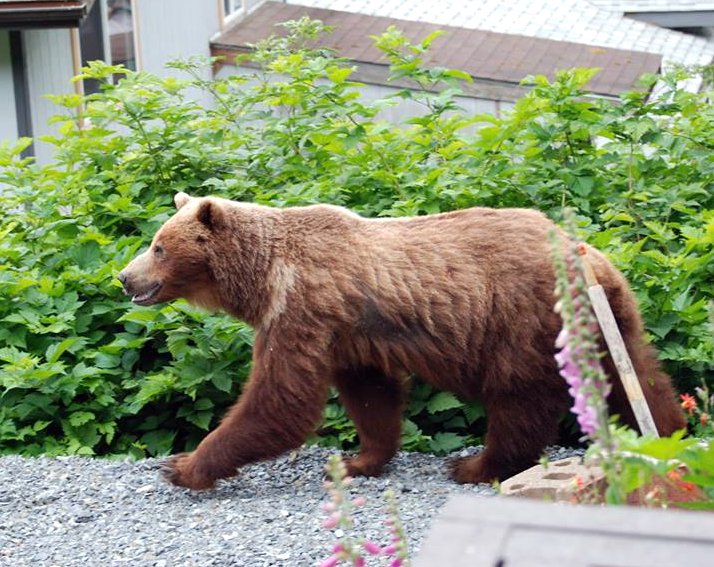
A brown bear strolls through a Sitka neighborhood in July, 2014. Sitka Police Lt. Lance Ewers says all the usual “hot spots” have seen bear activity this summer: Sawmill Creek Road from the DPS Training Academy out to the 2200 block, the Mills Street/Cross Trail area, and Halibut Point Road. “But new places are becoming hot spots all the time,” he says. Ewers and other officials believe that just a small fraction of Sitka residents (and some visitors who don’t know any better) are mishandling their garbage. (Facebook photo/Sitka Bear Report)
Authorities in Sitka have not been forced to destroy any bears this summer, but that streak could end soon if a few residents and visitors don’t tighten up their garbage disposal practices.
Sitka police Lt. Lance Ewers says officers have been responding to numerous bear calls — from residents who’ve observed the animals growing bolder about raiding garbage cans.
He says that neither the police or state troopers enjoy having to kill a problem bear.
“It’s unfortunately really close. Because we have a number of bears now who have learned that there’s a food source,” Ewers said.
Police this summer have written three citations under Sitka’s bear ordinance (Sitka General Code Section 9.24), which prohibits residents from placing bear-attracting garbage (i.e. “putrescible waste”) in their cans until the morning of collection day. But Ewers says part of the problem is caused by people who are recent arrivals or visiting short-term, and simply don’t understand common-sense rules for bear country.
“There are normal hot-spots, and 95-percent of our community is on board and understands that we live in bear country,” he said. “This is a people problem, not a bear problem.”
The rules are simple: No garbage that’s a known bear attractant can go in your outdoor can prior to 4 a.m. on pickup day. That includes most smelly food waste and its packaging, and even things like soiled disposable diapers. And it should go without saying that fish and deer carcasses are also on the list.
Ewers says that he encourages residents to notify police when someone isn’t handling garbage safely. Officers have been doing a lot of garbage cleanup lately, and they would rather get ahead of the problem, than be forced into the alternative.
“Nobody wants to see bears having to be destroyed,” he said. “But once a bear learns that garbage is a food source — because of one person, or two people, or four people who negligently put their garbage in their can early — and then that bear does what a wild animal does, and gets into it. That is a potential death sentence for the bear.”
Ewers says some shared dumpsters are also notorious for having attractive garbage, but it’s difficult for police to identify who’s at fault when the dumpster has trash from several families.
The alternatives for safe garbage storage in summer are simple: Keep your can indoors, in a garage or a shed with a door, until collection day. If that’s not possible, keep your smelliest garbage bagged up inside somewhere — ideally in the freezer.
The maximum fine in Sitka for the improper disposal of waste that attracts bears is $500. And it’s not just a summer issue: Two years ago, authorities were forced to destroy three problem bears near the end of October.
And this weekend, saw a high volume of bear activity in Sitka.
Sixteen calls were made to the Sitka Police Department reporting bear sightings or interactions. Most said that garbage was the bear attractant and multiple reports mentioned a sow and cub pair wandering around Anna Drive.
The rest of the sightings were in clusters along Sawmill Creek Road, with a couple off Halibut Point Road. No bears were harmed by officers.






























